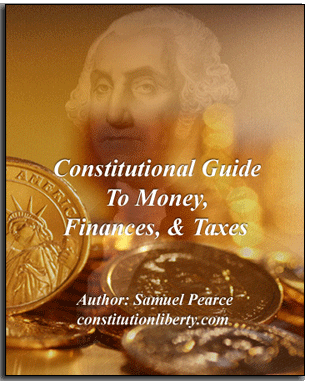



|
This book contains references, quotes, and excerpts about the Constitution and the Founding Fathers’ views on money, finances, and taxes. It provides an analysis of the value of money, which consists of standard weights and measures that were derived from Biblical principles. The content includes the constitutional tax structure, which consists of tonnages, imposts, and duties.
Throughout history, the debasement of money—reducing the intrinsic value of a coin by increasing its base-metal content or printing more paper money than the amount in demand—has been used by rulers and governments for various reasons.
Chapter 1 -Founding Fathers Quotes on Money, Banking, & Taxes
The Founding Fathers wrote about oppressive taxes, the virtues of sound money, and the perspective of the banking system. The Founders had various opinions and differences about the constitutional role of issuing money to the public. For example, George Washington, Thomas Jefferson, John Adams, and Alexander Hamilton agreed that the money should conform to standard weights and measures, and this was adopted into the Constitution. They believed that taxes to fund the government should be apportioned and limited.
Chapter 2 - Constitutional Money - Gold & Silver
Article I, Section VIII and Article I, Section X of the federal Constitution indicate that Congress is responsible for issuing money to the public, including all legal tender of debts. These articles serve as the basis for the American monetary system.
The Framers of the Constitution were influenced by Roger Sherman, who in 1752 described the failures of a paper money system in his prescient publication known as “A Caveat Against Injustice”
Chapter 3 - Andrew Jackson's Bank Veto Message of 1832
Andrew Jackson was the 7th president of the United States. He had strong views against the National Bank controlling the issuance of credit to the public, and he had many reasons why he believed the recharter of the bank should be vetoed. His concern about the bank included the authorized transfer of stock to foreigners, who would be exempt from federal and state taxation. He believed that a National Bank would lead to a transfer of ownership away from legal citizens of the United States over to foreign interests. According to Jackson, foreigners had their own monetary interests, which did not represent the people and would lead to poverty.
ISBN # 978-1466346222
Cost: $9.99
Size: 10 x 8 x 0.2 inches
Available at Amazon.com, constitutionliberty.com, and Kindle
MORE CHAPTERS - ORDER AT AMAZON ....
|